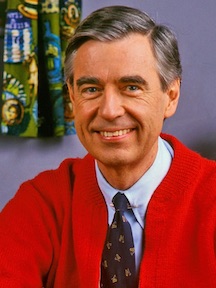By Lakin Allen
On the heels of the 2018 award-winning documentary Won’t You Be My Neighbor, directed by Morgan Neville, a new film telling the story of Fred Rogers soon will be coming to a theater in your neighborhood.
On November 22, A Beautiful Day in the Neighborhood will be released across the United States. Rogers will be portrayed by Tom Hanks, an actor almost equally as beloved as Rogers himself. Hanks, according to director Marielle Heller, was Rogers’ favorite actor. The movie will follow the story of Lloyd Vogel, a cynical journalist profiling Rogers for Esquire magazine. The inspiration for this film is a real article written in 1998 for Esquire by journalist Tom Junod. Vogel overcomes his doubt by learning from Rogers’ wholesomely optimistic attitude. In keeping with his belief that in any tragedy you can always look for the people helping, Rogers is portrayed as a helper to Vogel and a supporting character instead of the principal.
The cast and creative team gathered as much information on Rogers as possible, speaking with Joanne Rogers and many crew members who worked on Mister Rogers’ Neighborhood to gain insight into the man on and off the screen. Heller “wanted to do right by them.” She also said Joanne (Rogers’ wife) called her after watching the film and said her husband “would be really proud, and he would be really happy with the movie.” Heller mentioned at the Toronto International Film Festival that the TV icon did more than talk the talk. “The truth is, he lived what he preached. He had a message of kindness and of being present and a mission of listening, and he did it every day,” Heller said. “Our movie shows you his mission in action.”
Hanks also commented on the impact Rogers has had on his life. “Everybody that we met, that worked with Fred, said when you talked to Fred, you felt as though you were the most important person in the world. Playing Fred made me a better listener and . . . I think what I learned is that you can somehow choose an authentic life,” said Hanks. The actor also observed that “he [Fred] just wanted to make little kids, little human beings, feel safe even if they didn’t have all of the answers.” As someone who did not grow up watching Rogers’ show, Hanks expressed his wish “that when my kids were younger. . . when my son was three years old, that he and I sat down and watched half an hour of Mister Rogers a week because I would have better understood the role of a parent in saying to their children, it’s alright if you’re sad.” Citing Rogers as “the man who created the neighborhood of make believe,” Hanks talked about deconstructing the mystery of what his motivation was. “He was an ordained minister who never mentioned God on his show,” Hanks said. In interviews at the Toronto International Film Festival, where the film premiered, both Hanks and Heller shared their utmost respect for Rogers.
Rogers was a cornerstone of American culture and one of the most influential figures in children’s media. He was presented with a Lifetime Achievement Award at the Emmy Awards in 1997, and in 2002 he was the recipient of the Presidential Medal of Freedom. Before these accomplishments, however, Rogers was named an honorary member of The Phi Beta Kappa Society at Carnegie Mellon University in 1995.
Phi Beta Kappa honors and advocates for liberal arts and sciences in higher education. Rogers showed the value of a liberal arts and sciences education by using his to better the world around him. Having earned his bachelor’s degree in music composition from Rollins College in 1951, he also graduated from Pittsburgh Theological Seminary and was ordained as a Presbyterian minister in 1963. Following this, Rogers continued his education in child psychology at the University of Pittsburgh’s Graduate School of Child Development. His education shaped not only his Christian philosophy but also the creation of his hit show, Mister Rogers’ Neighborhood. Utilizing his music composition degree, he wrote and performed songs to help children understand different concepts, such as “It’s Good to Talk.” His study of child psychology informed which topics he presented on his show and how. An education in the liberal arts and sciences emphasizes the importance of communication and cultivates curiosity and creativity, all of which Rogers used through his work in television.
Rogers taught America about empathy, love, and kindness. And while his show targeted children, his legacy left an impact on multiple generations. The man who led by example how to truly love one’s neighbor shows how “it only takes one person to inspire a world of kindness,” as Hanks said. The simplicity of Rogers’ philosophy is timelessly valuable.
ΦBK member Lakin Allen is a senior at the University of Kansas majoring in journalism with minors in Spanish and Italian. She loves traveling the world and meeting new people over a good cup of coffee (or gelato!). She hopes to use her degree to continue learning from and sharing people’s stories. The University of Kansas is home to the Alpha of Kansas Chapter of Phi Beta Kappa.




